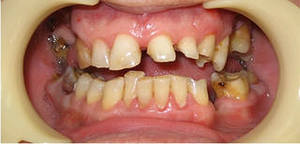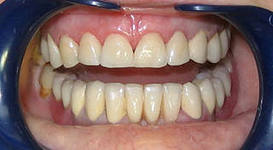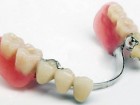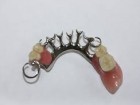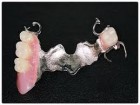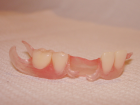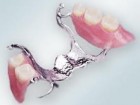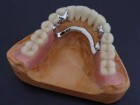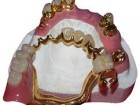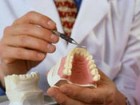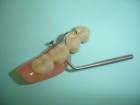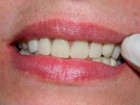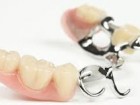Clasp prostheses
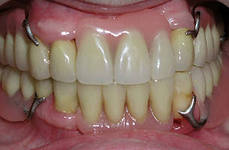
Clasp dental prosthetics represents one of types of popular removable prosthetics.Clasp dentures - high-tech orthopedic design.
The design is as follows: a metal arch of the clasp prosthesis, artificial teeth attached to a plastic base that imitates the gum, as well as fixing elements: crowns, locks, hooks.
The clasp prosthesis of the simplest design has a compact appearance, it is durable and durable.
Types of arch prostheses
Clasp prostheses can be partial or complete. A partial clasp prosthesis can be located on both sides, or on any one, as well as on the upper or lower jaw. A one-way clasp prosthesis is located on one of the sides of the oral cavity.
Types of Clasp Dentures by way of fastening.
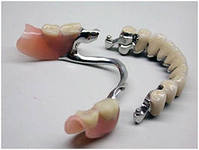
- On the clasps. Them toconstruction equipped with metal hooks (clasps). Hooks can be mounted on one tooth or two. This is a simple prosthesis.
- On micro locks. What does such a prosthesis look like? Locks (attachments) are hidden inside the prosthesis and consist of 2 parts, one of which is on the artificial crown of the patient’s tooth, and the second part of the lock is on the tooth of the prosthesis. This type of prosthesis attachment is indicated for periodontal disease.
- On telescopic crowns. With their help, the prosthesis is securely fixed.
Clasp dentures are available.
- Metalless clasp dentures. They are relevant for patients who have

Photo: types of arch prostheses allergic to metal.
- Clasp dentures are plastic. They have a plastic gingival base. One of such constructions is an acetal clasp prosthesis, in which acetal instead of a metal frame. Clasp prostheses from acetal are easy and convenient to use.
- Clasp dentures containing metal. Metal for clasp prostheses in the form of alloys is part of the frame. One-piece clasp prosthesis can be made of chromocobalt alloy, or gold platinum. One-piece clasp dentures have a monolithic frame.
- Clasp dentures made of cermet.
Pros and cons of clasp prostheses
Clasp dentures - cons.
- The disadvantages of clasp prostheses are that aesthetics are poor.
- The design flaws are that it is not always possible to make invisible to others fastening of clasp prostheses.
- One of the disadvantages of clasp prostheses is that you need to get used to them for a long time.
The advantages of clasp prostheses.
- Relatively low price.
- Excellent aesthetic qualities.
- It is not necessary to remove the prosthesis before bedtime.
- An opportunity to combine treatment and restoration of teeth.
- Prevention of gum disease.
- Easy denture care.
Pros and cons of clasp prostheses.
Dentures must be removed periodically, because they may require hygienic treatment of the frame. But the positive thing is that they do not need to be removed at night.
Clasp prostheses - pros and cons.
- Clasps provide reliable protection of the denture in the oral cavity, however, if the loads are strong, clasps can damage the tooth enamel.
- In certain situations, the clasp can be attached to the front teeth. To solve this problem, there are types of clasp dentures that are mounted on locks. This is the advantage of clasp prostheses before dentures made of plastic.
The better clasp nylon prostheses
Removable dentures - clasp and nylon dentures (see photo). Which are better clasp or nylon? What is more preferable specialist will decide for the patient. What are the pros and cons of these prostheses, consider below.
Clasp dentures are made of light materials, which the patient quickly and easily gets used to. In the manufacture of arch prostheses, modern casting methods are used.
The advantages of clasp prostheses.
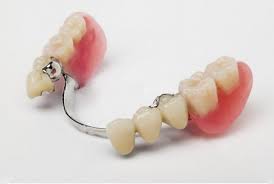
- Durability and reliability.
- Installation of clasp prostheses on the upper jaw allows you to leave the sky open.
- Remove only to clean the structure.
The disadvantages of clasp prostheses.
- At first, the patient may experience discomfort.
- To fix the prosthesis, a certain number of teeth is needed.
- An allergic reaction to metal is possible.
Nylon prostheses are made of nylon. This is a very pleasant and soft material for the gums.
The benefits of nylon prostheses.
- Lack of hooks, locks. Mounts are made of the same material that is invisible to
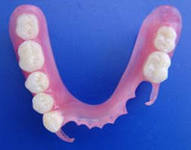
Photo: Nylon Denture surrounding.
- Do not cause discomfort when using.
- Do not break.
- Remove prostheses only in order to rinse them with running water.
- Almost invisible in the mouth.
- It does not cause allergies.
- Nylon prostheses are made using a thermopress device, and modern material flexite, from which prostheses are made, does not harm the body.
Indications for installation
- Clasp prosthetics are recommended for defects in the dentition.
- Lack of front teeth. Clasp prosthetics of the front teeth eliminates this defect.
- Lack of teeth on the lower jaw. The defect arch prosthesis of the lower jaw will help to eliminate the defect.
- The absence of one or more teeth on one side. The arch prosthesis with a one-sided tooth defect solves this problem.
- Periodontal disease. With periodontal disease, the clasp prosthesis fixes loose teeth, which can help strengthen them.
- Pathological abrasion of teeth.
- Malocclusion. Clasp dentures in the complete absence of teeth are made to restore them.
How to store clasp dentures
Soft clasp dentures require proper care. How often to remove clasp dentures? How to store clasp dentures? They do not need to be stored in a glass of water.
It is recommended to remove structures twice a day for hygiene procedures. Before removing the clasp prosthesis, rinse your mouth well with water. Careful treatment of clasp prosthesis necessary so that microbes do not develop under them.
These measures will help prevent complications, both on the part of the gums and healthy teeth.
Repairs
Repair of archways may be required in cases where it occurs: the erasure of plastic teeth, the boundaries of the prosthesis change. This leads to a violation of the fixation of the prosthesis. As a result, the chewing function and aesthetic qualities of the prosthesis are disrupted. In such cases, relocation of the prosthesis is necessary.
Pros and Cons (disadvantages)
- The disadvantages of clasp prosthetics are that when installing a clasp clasp prosthesis, metal hooks attached to the front teeth are visible.
- Long adaptation time due to the presence of metal elements.
- To eliminate discomfort when using the prosthesis, a clasp prosthesis correction is required. The need to remove the prosthesis twice a day for hygiene measures is also a minus.
- How much is clasp prosthesis? Regarding the cost, given that the clasp dentures have a complex manufacturing technology, the price will be higher than the bridge and laminar dentures.
Contraindications (complications)
Contraindications to clasp dentures.
- Periodontal overload of supporting teeth.
- Small amount of remaining teeth.
- Low crown of teeth.
In connection with the existing contraindications to the installation of clasp prostheses, it is better to plan their installation after examination.
How to attach (installation)
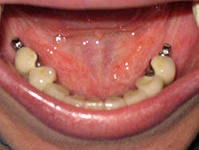
Removable dentures are sometimes mounted on beams, which is typical for implant prostheses.
Clasp prostheses can be fixed with clasps or locks. Fastening with locks is made to artificial crowns. The locks are hidden inside the clasp, due to which a cosmetic effect is achieved.
Life time
The service life of the clasp prosthesis with proper care is from 5 to 10 years.


